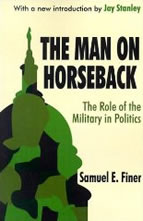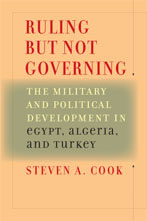Today I will give a presentation at the Kennedy School on an issue that has become ever more interesting in recent weeks: what is happening in Turkey currently in the field of civil-military relations? For more details please go here.
Turkey’s current transformation – in particular concerning the changing role of the Armed Forces – needs to be put in a wider context, both global and European.
As I noted in the seminar here last week it is not long ago that military interventions in politics were everything but rare. In 1962 successful coups took place in Burma, Argentina and Syria; failed coups in Lebanon, Portugal, Venezuela and Turkey. The Times noted in 1960, following the first Turkish coup against an elected civilian government, that “this has been a good year for generals.”
Since the 1960s the Turkish military has been carrying out many more interventions. However, while the officer corps has remained isolated from wider changes in Europe as well as in Turkish society the international acceptance of any military intervention has declined significantly – in Europe it has now reached a point of zero tolerance.


Recommended Reading
A good book for a historical perspective is Samuel Finer’s The Man on Horseback – The Role of the Military in Politics, published in the 1960s. Finer tries to quantify military interventions: he examines the 76 independent states which existed in the world in 1955 and finds that there had been military interventions in 47 of them.
Finer’s table: states and military interventions:
| before 1861 | 46 states in the world | military intervention in 26 |
| 1861-1899 | 2 more states (Serbia/Bulgaria) | military interventions in 2 |
| 1900-1917 | 3 more states | military interventions in all 3 |
| 1918-1944 | 10 more states | military interventions in 7 |
| 1945-1955 | 15 more states | military interventions in 9 |
A second interesting book focusing on Turkey is Gareth Jenkins’ Context and Circumstance: The Turkish Military and Politics. It appeared as an Adelphi Paper, published by the International Institute for Strategic Studies, in 2001. While I find Gareth Jenkins writings on the Ergenekon trial unconvincing and at times misleading – more on this here later – his text on the Turkish military is a very good introduction.
Jenkins sets out the structural features and ideological motivations and historical references that have set Turkey’s civil-military relations apart from those elsewhere in Europe. As Jenkins notes at the very outset, his book wants to explain, not judge, an exceptional situation:
“the continued domination of Turkish politics by the country’s military appears to be an anomalous anachronism, even an anathema. As a result, discussions of civil-military relations often become coloured by moral judgements as military involvement in politics is seen as not only undesireable but almost an affront to a natural order. The purpose of this paper is neither to condemn not to justify the Turkish military’s involvement in politics; merely to try to understand and explain.” (p5, emphasis added)
At the heart of the Turkish exception is the ideological nature of the Armed Forces’ commitment:
“But what makes the Turkish military unique is that it sees itself as having an almost sacred duty to protect an indigenous ideology, namely Kemalism, the principles laid down by the founder of the Turkish republic, Kemal Ataturk. This ideological dimension to the military’s perception of its role has meant that its definition of security extends beyond public order and Turkey’s political or economic interests to include threats to the country’s Kemalist legacy.”
Central to the world-view of the Turkish officer is the sense that both external and internal threats have enduring roots in Turkey’s past. An important element of military education is the Nutuk speech made by Ataturk, in which Ataturk describes Turkey’s enemies during the War of Liberation (1919-1922):
“Ataturk’s Great Speech of October 1927, the Nutuk, in which he summarised the Turkish War of Liberation, has a position akin to a sacred book and his pronouncements on a vast range of subjects are cited to support arguments as if they were virtual holy writ.” (p 32)
Jenkins notes that this is true not only for the Armed Forces but pervasive in Turkish society and in its national education system:
“Turks are taught, and most believe, that their country is under continual external and internal threat, both from other countries plotting to divide or acquire Turkish territory and from internal forces seeking to change the constitutional status quo. The result is often a virtual siege mentality, riddled with impossibly intricate conspiracy theories.”
“Turkish schoolchildren are taught that the 1920 Treaty of Sevres, which, though never ratified and subsequently superseded by the 1923 Treaty of Lausanne, foresaw the allocation of large tracts of modern Turkey to Greece, Armenia, Italy and France (the latter two in the form of mandates), and the eventual creation of an independent Kurdish state, still represents the real intentions of the West towards Turkey.” (pp16, 17)
However, such views are particularly strongly represented among those who pursue a military career, where they form the core of the curriculum:
“The teaching of history in the military academies places considerable emphasis on the foundation of the Turkish Republic. Cadets are taught that the Ottoman Empire was eroded by a combination of foreign avarice and a paucity of patriots prepared to defend the homeland. (p 32)
In January 1999 the military academy in Ankara published a booklet calling for a second ‘War of Liberation’ against Islamic fundamentalism:
“Continual exhortations to identify with Ataturk and to see him as an immortal guiding presence effectively brings the past into the present. Indeed, cadets are explicitly taught that, although circumstances and methods may change, the external and internal threats to the country – threats which they are legally as well as morally obliged to repulse – are fundamentally the same as in Ataturk’s lifetime … international pressure to allow greater political pluralism appears reminiscent of Allied attempts to divide Turkey at Sevres.” (p 33)
Jenkins quotes General Nahgit Senoglu, the head of the Military Academies, who told the new intake of cadets in 2000:
“You will see that Turkey has the most internal and external enemies of any country in the world. You will learn about the dirty aspirations of those who hide behind values such as democracy and human rights and who want to take revenge on the republic of Ataturk.”
Such as threat perception also serves to legitimise the privileged position of the Armed Forces:
“The military’s role is further bolstered by public perceptions of the security environment, where external and internal threats are often inflated and distorted by conspiracy theories in which even Turkey’s NATO allies are secretly plotting to weaken and divide the country.1 In such a situation, it is to the military that most Turks turn […] .”(P 9)
Being educated as a military officer also includes other messages, writes Gareth Jenkins,
“From the moment that they enter the military academies officer cadets are told that they are joining an elite, […] with a sacred mission to protect Kemalism.” (p30)
Jenkins explains that the “strict military hierarchy starts in the military high schools and academies”, and even underlines that “military officials admit that the hierarchies and deference to authority in Turkish society, particularly within the family, play a significant role in enabling cadets to adapt to a military environment.” The “relative social isolation of the academies and the inculcation of a sense of being distinct from society at large inevitably combine to produce an increasing identification with their fellow cadets and the armed forces as an institution.” (p 30)
Jenkins writes that the Turkish military has “traditionally vigorously resisted any attempt by the civilian authorities to investigate allegations against serving or retired officers.” (p 29), refusing to
“cooperate with investigations into, allegations of corruption or human rights abuses involving members of the security forces, especially the gendarmerie, apparently because it believes that even an investigation would harm the image of the armed forces. For example, in spring 1997 the TGS refused to allow a parliamentary committee investigating allegations of collaboration between elements in the security apparatus and the Turkish underworld to question members of the gendarmerie. Similarly, it has refused to allow external investigations of allegations of the use of beatings, usually by NCOs or lower-ranking officers, to discipline conscripts, insisting that such cases must remain the exclusive prerogative of the military courts. (p 30)
(To read more or to order the book go here).
Finally, let me recommend one more thought-provoking book: Steven A. Cook’s Ruling but not Governing on militaries in Egypt, Turkey and Algeria, published in 2007.
Cook examines what he calls “authoritarian stability” in “military-dominated states”. In such systems democratic facades allowed officers to rule without having to govern. Cook notes that in Turkey for a long time “pseudodemocratic institutions give the military the respect and admiration of large majorities of the Turkish people. Although the officers are responsible for the political order, the presence of institutions resembling a democratic polity effectively shields them from any public dissatisfaction.” (p.106)
Cook quotes a Turkish officer telling Mehmet Ali Birand:
“We are opposed to anybody, no matter whether they are there by the grace of the ballot box or the votes of the National Assembly, who attempts to violate Ataturk’s principles. We have a right to act to this end in the interests of our own people, and for their protection.” (p 102)
He examines how “Turkey has been able to undertake an extraordinary and wide-ranging program to dismantle its authoritarian institutions” in recent years, a transformation he considers “extraordinary”: while changes to the structure of the National Security Council in 2001 were still cosmetic, by 2004 they significantly downgraded the formal power of the military to influence civilian decision making. So did other changes, including a constitutional amendment in 2004 that rescinded the military’s exemption from Court of Auditors’ oversight.
In this transformation the role of the EU is decisive. Cook wonders whether there are any general lessons in this, but does not elaborate:
“It is fashionable, particularly among Arab elites, to say that democracy cannot be imposed from the outside, but the lessons of EU-Turkey relations indicate that the United States and France can play a role facilitating conditions more conducive to democratic change in Egypt and Algeria. … “
Cook rightly underlines that the Internal Service Act (1961) remains intact, including article 85 which states that the “Armed Forces shall defend the country against internal as well as external threats, if necessary by force.” This is but one sign that Turkey’s democratic revolution is not yet complete. He lists the following institutional innovations as essential:
- to subordinate the General Staff to a civilian minister of defence
- to empower the Council of State and other parts of the judicial branch to overrule the Supreme Military Council
- to overhaul the internal service codes of the armed forces, which justify the military’s intervention in politics
- to alter the curriculum at military academies and staff colleges
I would add a few additional concrete steps to this essential list, including:
- to clarify the limitations of the military judicial system
- to finally implement Turkey’s commitment to allow conscientious objectors to do alternative service
- to undertake the full regular auditing of military expenditures in line with the 2004 constitutional amendments
I share Cook’s fascination for Turkey’s recent transformation and his assuymption that it holds a lot of interesting lessons. He concludes on an optimistic note: even in the Middle East
“countries with authoritarian political systems are not necessarily fated to manifest nondemocratic politics in perpetuity – forever is, after all, a long time … the Turkish transition highlights how external actors can nurture a political environment more conducive to peaceful, democratic change.”
This is an issue I hope to explore more with my students in the seminar on intervention in coming weeks.
Further reading:
- There is of course so much happening in Turkey in this area at the moment that it is hard to keep up. For more on the arrests of last week go here for an article in Today’s Zaman and here for another in Hurriyet Daily News
- For opinion pieces take a look at these, but there are many, many more:
- Mustafa Akyol: Does the Turkish military make plans to kill Turkish people? and other op-eds on his page.
- Orhan Kemal Cengiz: History in the Making
- There are many more articles by Orhan Kemal Cengiz, one of the leading human rights lawyers in Turkey today, on this facebook page.
- There was recently an interesting article in the Economist, in case you missed it.
- And finally there is background material on the recent military documents – the Action Plan and the Cage (Kafes) Plan – on the ESI website.
